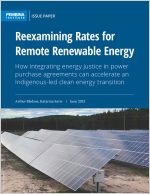
This report provides a comprehensive survey of government policies and private sector initiatives to support and market green power (low-impact renewable electricity) that were active in Canada by the end of 2002. For each program, the report presents a brief description of the initiative,calculates its contribution to each jurisdiction's electricity production,and estimates the resulting reductions in emissions of greenhouse gases and pollutants that cause smog and acid rain. The report also reviews green power certification systems, and includes an update on new green power programs that have emerged in 2003.
Key findings include the following:
- Green power products are available in Canada in rapidly growing numbers.But despite its growth, Canada's green power sector is still very small compared to several other industrialized countries, primarily because federal and provincial governments have not yet adopted the policies that have been implemented in support of green power elsewhere.
- Generation capacity associated with green power programs active at the end of 2002 was dominated by wind (43%), hydro (about 36%) and biomass (about20%) facilities. Thirty-six percent of this capacity is located in Alberta,27% in Ontario, 19% in Québec and 14% in British Columbia. But production of electricity by these facilities remained small as a proportion of total jurisdictional electricity production — 1.6% in Alberta, 0.9% in British Columbia, 0.5% in Ontario and 0.5% for Canada as a whole.
- Green power programs reduced Canada's greenhouse gas emissions in 2002 by about one megatonne of carbon dioxide equivalent.
- Certification systems — notably the federal EcoLogo program — are playing an important role in developing markets for genuine, low-impact green power.
A key function of certification is to prevent the environmental benefits of green power being claimed more than once. But the EcoLogo program is not currently clear enough on this point.


